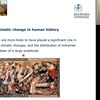fredlig

Fredrik Jansson
Senior Lecturer, Mathematics/Applied Mathematics I am a senior lecturer in mathematics/applied mathematics at Mälardalen University and a research affiliate at the Centre for Cultural Evolution at Stockho.
Moa Bursell & Fredrik Jansson: Ethnic Homophily and Social Influence in Workplace Preferences
Moa Bursellis a postdoctoral researcher in Sociology at the Institute for Futures Studies and a member of the Stockholm University Linnaeus Centre for Integration Studies (SULCIS). Fredrik Jansson has
Fredrik Charpentier Ljungqvist: Impacts of past climate variability – lessons for the 21st century
Place: Institute for Futures Studies, Holländargatan 13, Stockholm or onlineREGISTERResearch seminar with Fredrik Charpentier Ljungqvist, Professor of History.ABSTRACT The talk will start with summaris
Cultural systems
The Oxford Handbook of Cultural Evolution, red. Jamshid J. Tehrani et al. Abstract Many cultural phenomena cannot be understood by studying traits in isolation. Instead, they are embedded in webs of rel
Cultural traits operating in senders are driving forces of cultural evolution
Proceedings of the royal society Biological Sciences Abstract Cultural evolution typically studies how ideas and behaviours spread and change depending on how we learn and from whom. A new model suggest

Fredrik Charpentier Ljungqvist: Impacts of past climate variability – lessons for the 21st century
The talk summarizes key findings of state-of-the-art research on how climate variability and change have affected different aspects of human history in medieval and early modern Europe (c. 700–1815 CE

Hur arbetstagare kan skapa arbetsplatssegregering. Intervju med Moa Bursell och Fredrik Jansson
När man pratar om segregering av arbetsplatser riktas ljuset lätt mot arbetsgivaren och kanske framför på det sätt en verksamhet rekryterar sina anställda. Men så länge det finns rörlighet på arbetsma
Pitfalls in Spatial Modelling of Ethnocentrism
Journal of Artificial Societies and Social Simulation 16 (3) 2 http://jasss.soc.surrey.ac.uk/16/3/2.html Abstract Ethnocentrism refers to the tendency to behave differently towards strangers based only on
Criminal organizing applying the theory of partial organization to four cases of organized crime.
Trends in Organized Crime, pp 1–28, doi:10.1007/s12117-017-9315-6. Abstract We explore how the idea of partial organization can provide insights in the study of organized crime. Studying criminal organi
Diversity preferences among employees and ethnoracial workplace segregation
Social Science Research. doi.org/10.1016/j.ssresearch.2018.03.009 Abstract Ethno-racial workplace segregation increases already existing ethno-racial inequality. While previous research has identified d








